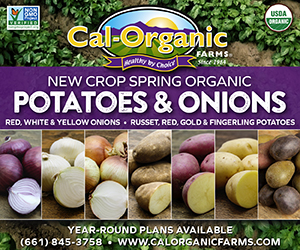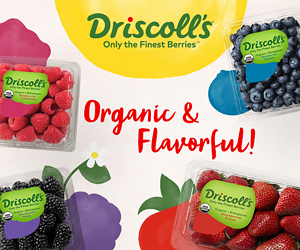An employee was working in the organic produce section stocking a few cases of various items. I watched the process for a few minutes and observed the clerk toss bunches of beets into a box. Glancing in the box, I spotted several wilted, damaged and off-conditioned organic items.
I asked about the box of distressed produce. The clerk said, "The organic produce doesn't seem to hold up too well and we have to pull it. We lose a lot of the items. The district manager is always getting on us about keeping only fresh produce on displays. He also comes down a lot on the produce manager about the shrink."
Careful handling of organic items is crucial in preventing shrink damage
As I started to turn away, I saw rough mishandling of several delicate organic items by the clerk's awry stocking practice. Sensitive types of organic produce items deteriorate faster by mishandling them, starting the “shrink process.”
The stocking mistreatment I witnessed was only one of several reasons as to how and why a greater shrink can occur. The best way, however, to learn about causes and solutions is to get out into the stores and talk to the people.
I met discussed shrink and food waste with produce managers from several supermarkets, covering a wide area of their experiences in ordering, receiving, preparing, displaying, and selling organic produce items.
Jeff Tomassetti, produce and floral director for Buehler's Supermarkets in Wooster, Ohio told me, "I feel the biggest cause for higher shrink in the organic category would be the higher retail price points which sometimes scare the customers away. Secondly, I don't always think the product comes in as fresh as some of the conventional product that turns over quicker."

Jeff Tomassetti, Produce & Floral Director, Buehler's Supermarkets
After a few weeks of research, it appears the majority of causes for shrink are very similar to conventional produce, with some predominant areas found to be leading causes in magnifying the shrink of organic produce —— handling, temperature, cashier identification, shelf life, and pricing.
One of the challenges of organic produce is shelf life--- which begins within the first few days of harvesting, packing and shipping. The amount of shrink depends on the perishability of items like leafy greens, lettuce, herbs, berries, peppers, etc. Shelf life is a critical "timing" process within the cold chain, with rapid turnover highly imperative.
Tossing or dropping cartons of organic product easily causes shrink
Below are the five vital areas that contribute to additional shrink of organic produce:
1) Handling — Rough handling of sensitive organic items can easily cause bruising and damage to the product. Tossing boxes of organics on carts and the floor or rough handling while stocking it onto displays is a component of shrink.
2) Temperature — Most produce requires suitable temperatures to maintain freshness and avert wilting. Abnormal refrigeration conditions will raise the chances of shrink.
3) Cashier Identification — There are still a lot of item identification problems at front end checkouts, with organic items are being rung up as conventional. This simple mistake shows up as shrink on paper.
4) Shelf Life — Many organic items are more perishable than others, which lowers its shelf life. The journey from harvest to stores is considerably lengthened. The cold chain is vital during this period. Shrink can occur at any critical level.
5) Pricing — Organic produce is commonly price-enhanced. As a rule, the higher the retails, the less purchasing is made by consumers. When organic item movement becomes sluggish due to higher retail pricing, the product sits and winds up in shrink. Turnover is the key to prevent that shrink.
Organic ID's at the front checkouts can often cause confusion
In the end, there must be more teaching and training of employees about organic produce. Educating the work force to the sensitivity of organic product will go a long way in savings to both product and the bottom line.
Organic produce training is imperative in order to combat prolonged shrink losses, and in preventing product damage.
Ron Pelger is the owner of RonProCon, a produce industry advisory firm. He can be contacted by e-mail at ronprocon@gmail.com.






